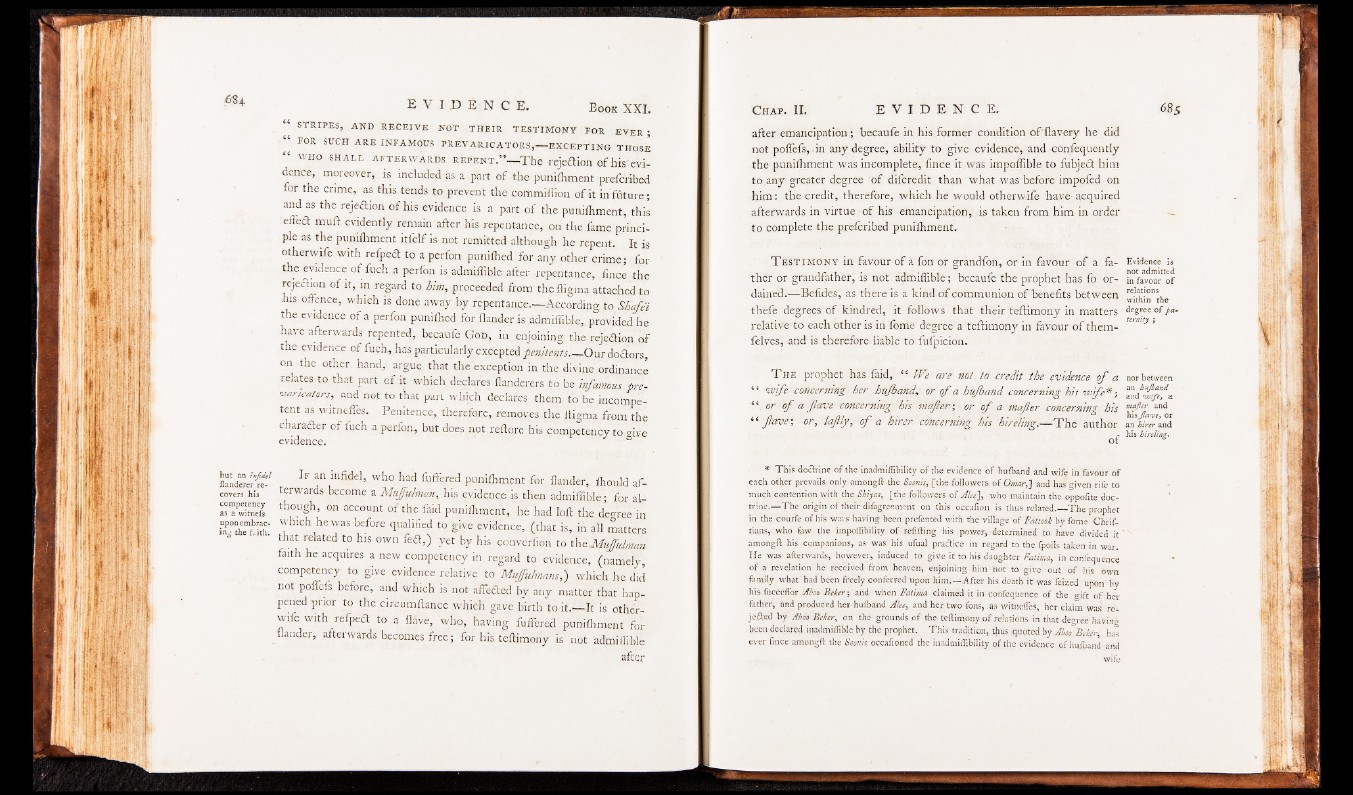
but an infidel
flanderer re-:
covers his
competency
as a witnefs
upon embracing
the faith.
S T R IP E S , A N D R E C E IV E , N O T T I IE IR T E S T IM O N Y FOR E v e r ;
FOR SUCH A R E INFAMOUS P R E V A R IC A T O R S ,----E X C E P T IN G THO SE
“ WHO s h a l l a f t e r w a r d s r e p e n t . ” — The rejeftion of his'evidence,
moreover, is included as a part of the punifhment prefcribed
for the crime, as this tends to prevent the commiffion of it in future;
and as the rejection of his evidence is a part of the punifliment, this
: effect mull evidently remain after his repentance, on the fame principle
as the punifliment itfelf is not remitted although he repent. It is
otherwife with refpeft to a perfon puniflied for any other crime; for
the evidence of fuch a perfon is admiflible after repentance, fince the
rejection of it, m regard to him, proceeded from theftigma attached to
his offence, which is done away by repentance.— According to Shafei
the evidence of a perfon puniflied for flander is admiflible, provided he
have afterwards repented, becaufe G o d , in enjoining the rejeftion of
the evidence of fuch, has particularly excepted penitents__Ourdodlors,
on-the other hand,' argue that the exception in the divine.ordinance
relates to that part of it which declares flanderers to be infamous prevaricators,
and not to that part which declares them to be incompetent
as witnefles, Penitence, therefore,, removes the Itigma from the
charadter of fuch a perfon, but does not reftore his competency to o-ive
evidence. 0
If an infidel, who had fuffered punifliment for flander, lhould afterwards
become a Mujfulman, his evidence is then admiflible!. for although,
on account of the faid punifliment, he had loft the decree in
which he was before qualified to give evidence, (that is, in all matters
that related to his own led!,) yet by his converfion to the Mujfulman
faith he acquires a new competency in regard to evidence, (namely,
competency to .give evidence relative to Mujfulmans,') which he did
not poffefs before, and which is not affedted by any matter that hapr
peiied prior to the circumftance which gave birth to it.— It is other-
wife with refpedt to a Have, who, having fuffered punifhment for
flander, afterwards becomes free; for his teftimony is not admiflible
after
after emancipation; becaufe in his former condition of'flavery he did
not poffefs, .in. any degree, ability to give evidence, land confequently
the punifliment was incomplete, fince it was imppflible to fubjedl him
to.any greater degree of difcredit than what was before impofed on
him: the credit, therefore, which he would otherwife ha,ye-- acquired
afterwards in virtue of his emancipation, is taken from him in order
to complete the prefcribed punifliment.
T e s t i m o n y in favour o f a fhn !or grandfbn, or in favour o f a father
or grandfather, is not admiflible; becaufe the prophet has fo ordained.—
Befide's, as there is a kind of communion of benefits between
thefe degrees of kindred, it follows that their teftimony in matters
relative to each other is in fome degree- a teftimony in favour of them-
felves, and is therefore liable to fufpicion.
T he prophet has. faid, “ We are not to credit the evidence o f a
“ ’wife concerning: her hujhandor o f a hufband concerning hisw ife* ;
'“ .'or o f a flave .concerning his maften-, or o f a rnafter concerning his
“ fluve-, or, laftly, o f a hirer concerning his ‘hireling.— The author
of
* T h is doflrine of-the inadmiffibility o f thé evidence o f hutband and wife in favour o f
each other prevails only amongft the Soonis, [the followers; o f Omar,'] and has given rife to
much contention with the Shiyas, [the followers o f Alee], who:maintain the oppofite.doctrine.—
T h e origin'of their difagreement on this occafion is thus related.__T h e prophet
in the courfe o f his wars having been prefented with the village o f Fattook by fome Chrif-
tians, who faw the impoffibility o f refitting his power, determined to have divided it
amongft his companions, as was his ufual praSice in regard to the fpoils taken in war.
He was afterwards, however, induced to g iv e it to his daughter Fatima, in confequence
o f a revelation he received from heaven, enjoining h im'not to give out o f his own
family what had been freely conferred upon him.— After his death it was feized upon by
his.fucceflor A tn Beker-, and when Fatima claimed it in confequence o f the g ift o f her
father, and produced her hufband Ake, arid bet* two fans, as witnefles, her claim was reje&
ad by Aboo Beier, on the grounds o f the-teftimony o f relations in that decree havingbeen
declared inadtniffible by the prophet. T h is tradition, thus quotcd by Aboo B c ic r has
ever fince amongft the Soonis occafioned the inadmiffibility o f the evidence qfhufband and
wife
Evidence is
not admitted
in favour o f
relations
within the
degree o f pa*
ternity ;
nor between
an hußand
and 'wife, a
maßet and
his flawt or
an hirer and
his hireling.